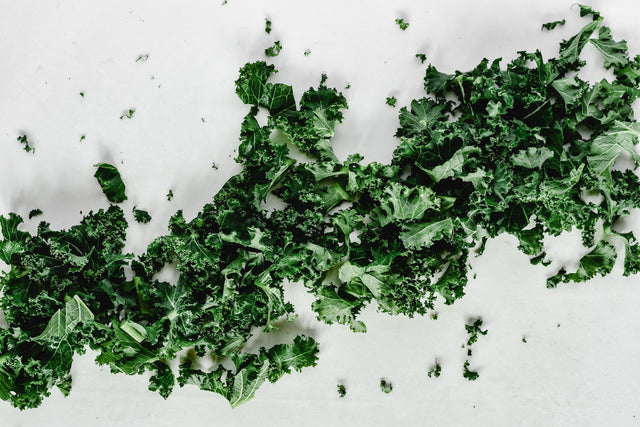Edamame, or soybeans are one of the most power packed veggies on the planet. Bursting with protein, vitamins, and nutrients, edamame has been shown to have a variety of benefits that play a pivotal role in chronic disease prevention. Learn more about edamame's health benefits from aiding weight loss to reducing your risk of cancer.
What Is Edamame
Edamame are immature soybeans, found in the pod. Popularized as a nutritious protein snack, edamame is low in fat, high in protein, and an excellent source of dietary fiber. Soybeans are unique because they are a concentrated source of isoflavones. Isoflavones are unique phytoestrogens (plant estrogens) which have faint estrogenic properties. Research shows that isoflavones, could in fact play a crucial role in preventing chronic disease states, such as cancer, heart disease, and osteoporosis [R].
Edamame Nutrition
Edamame is a great source of protein, with nearly 20g per cup. It’s also considered a complete protein, with all nine essential amino acids, providing a robust protein source for vegans and vegetarians. Notably, the protein found in soy is actually of higher quality when compared to other plant protein sources, and even compared to animal proteins. According to the USDA food database one cup (155g) of edamame contains
Calories 188
Fat 8g
Carbohydrates 13.8g
Protein 18.4g
Fiber 8g
Sugar 3.38g
Calcium 97.6mg
Iron 3.52mg
Potassium 676mg
Magnesium 99.2mg
Zinc 2.12mg
Vitamin K 41.4 ug
Additionally, edamame contains valuable phytonutrients, and is an excellent source of antioxidants which can help eradicate free radicals and oxidative stress. Edamame is also high in dietary fiber, with 8g per cup providing nearly 25% of your daily recommended intake.
4 Must Have Edamame Health Benefits
Edamame Promotes Better Heart Health
Studies show that soybeans have the potential to decrease serum cholesterol concentration. Soybeans contain isoflavones genistein and daidzein, which have been shown to improve vascular health and lower LDL “bad” cholesterol levels.
A meta-analysis published in the New England Journal Of Medicine, evaluated 38 controlled clinical trials to examine the relation between soybeans and lipid concentration. The analysis found that soy significantly decreased serum concentrations of total cholesterol, LDL cholesterol, and triglycerides without significantly affecting serum HDL cholesterol concentrations [R].
Edamame also contains nearly half the daily recommended amount of vitamin K. Vitamin K activates a protein that helps prevent calcium from depositing in your arteries. Calcium deposits contribute to the development of plaque, which is directly related to heart disease [R].
Edamame also contains a robust amount of fiber. In a Harvard study, that included over 40,000 male health professionals, researchers found that high total dietary intake was correlated with a 40% lower risk of developing coronary heart disease [R].
Edamame May Improve Bone Health
Edamame benefits your bone health. Vitamin K as well as calcium are both needed for healthy bone development, growth, and tissue repair. Research shows that vitamin K deficiency is inextricably linked to osteoporosis. Several observational studies have also linked low levels of vitamin K, with a higher risk of bone fractures [R].
It’s also indicated that isoflavones found in edamame may promote bone health based on the estrogenic properties of isoflavones and the similarity in structure between isoflavones and the osteoporosis drug, ipriflavone, which is a synthetic isoflavone [R].
Large epidemiological studies found that soy intake was associated with a 30% lower risk of bone fracture. Other prospective epidemiological studies found that
Edamame Aids In Weight Loss
One benefit of edamame is that it’s loaded with fiber. Fiber can help support your weight loss goals, by slowing down digestion, and improving your gut microbiota. Fiber is not metabolized like other types of carbohydrates such as simple carbs which, raise your blood insulin levels, and aid in body fat accumulation. Fiber provides a slow release of energy over time, as well as improves satiation and hunger cues.
A study published in the Annals Of Internal Medicine, found that ingesting 30g of fiber per day, can help you lose weight and improve your body’s response to insulin.
Edamame May Reduce Your Risk Of Cancer
Several observational studies have shown that estrogen modulatory effects of isoflavones, are theorized to reduce the risk of breast cancer in women [R]. Other studies have also pointed, that isoflavone rich foods are also associated with lowered risk of breast cancer later in life [R].
In men prostate cancer is the second most diagnosed cancer worldwide and fourth most common type of cancer overall. Intervention studies involving prostate cancer patients generally show that isoflavone exposure slows the rise in prostate specific antigen (PSA) levels [R].Therefore adding more edamame to your diet, may provide protective affects against some types of cancer.
Edamame Health Benefits: Takeaway
Adding edamame to your weekly nutrition plan, is a great way to get some added protein and valuable micronutrients to help you meet your macros and promote overall health and wellness. Not only that, it's easy and convenient. Just grab a bag of frozen edamame from your local grocer, pop them in the microwave, or boil them and you've got yourself a protein packed snack in no time at all.
Need Help With Optimizing Your Diet And Nutrition Plan To Finally Get The Results You've Been Waiting For?
SWOLVERINE IS AN ENDURANCE ATHLETE AND ACTIVE LIFESTYLE BRAND. MADE FOR THE ELITE ATHLETE, AND THE STRONG-WILLED OUR PRODUCTS WERE DESIGNED TO FUEL YOUR ATHLETIC PERFORMANCE. WE PERFORM WHEN YOU PERFORM.
We believe that everyone can optimize not only their athletic performance but their human potential. The way we believe we can optimize performance is through transparency, clinically effective doses, and clinically proven ingredients with evidence-based outcomes. We provide the nutrients you need to power your active lifestyle.
References
Messina MJ. Legumes and soybeans: overview of their nutritional profiles and health effects. Am J Clin Nutr. 1999 Sep;70(3 Suppl):439S-450S. doi: 10.1093/ajcn/70.3.439s. PMID: 10479216.
Anderson JW, Smith BM, Washnock CS. Cardiovascular and renal benefits of dry bean and soybean intake. Am J Clin Nutr. 1999 Sep;70(3 Suppl):464S-474S. doi: 10.1093/ajcn/70.3.464s. PMID: 10479219.
Anderson JW, Johnstone BM, Cook-Newell ME. Meta-analysis of the effects of soy protein intake on serum lipids. N Engl J Med. 1995 Aug 3;333(5):276-82. doi: 10.1056/NEJM199508033330502. PMID: 7596371.
Messina M, Messina V. Soyfoods, soybean isoflavones, and bone health: a brief overview. J Ren Nutr. 2000 Apr;10(2):63-8. doi: 10.1016/s1051-2276(00)90001-3. PMID: 10757817.
Wu AH, Wan P, Hankin J, Tseng CC, Yu MC, Pike MC. Adolescent and adult soy intake and risk of breast cancer in Asian-Americans. Carcinogenesis. 2002 Sep;23(9):1491-6. doi: 10.1093/carcin/23.9.1491. PMID: 12189192.
Phase II trial of isoflavone in prostate-specific antigen recurrent prostate cancer after previous local therapy.Pendleton JM, Tan WW, Anai S, Chang M, Hou W, Shiverick KT, Rosser CJ
BMC Cancer. 2008 May 11; 8():132. [PubMed] [Ref list]
Review An overview of the health effects of isoflavones with an emphasis on prostate cancer risk and prostate-specific antigen levels.Messina M, Kucuk O, Lampe JWJ AOAC Int. 2006 Jul-Aug; 89(4):1121-34.[PubMed] [Ref list]
Find similar articles:
Nutrition













